- <a href="https://library.nhrc.or.th/en" aria-label="home" class="mainMenu"> <em class="fas fa-home"></em> </a>
-
About Us
ย้อนกลับ About Us<a href="https://library.nhrc.or.th/en/history" aria-label="menu" class="submenu-list" target="_self"> History </a> <a href="https://library.nhrc.or.th/en/structure" aria-label="menu" class="submenu-list" target="_self"> Organization </a> <a href="https://library.nhrc.or.th/en/vision" aria-label="menu" class="submenu-list" target="_self"> Vision/Mission </a> <a href="https://library.nhrc.or.th/en/award" aria-label="menu" class="submenu-list" target="_self"> Awards </a> <a href="https://library.nhrc.or.th/en/announce" aria-label="menu" class="submenu-list" target="_self"> Regulation/Notification </a> Organizational PolicyGallery<a href="https://library.nhrc.or.th/en/website-policy" aria-label="menu" class="submenu-list"> Website Policy </a> <a href="https://library.nhrc.or.th/en/website-security-policy" aria-label="menu" class="submenu-list"> Website Security Policy </a> <a href="https://library.nhrc.or.th/en/personal-information-protection-policy" aria-label="menu" class="submenu-list"> Personal Information Protection Policy </a> <a href="https://library.nhrc.or.th/en/privacy-policies" aria-label="menu" class="submenu-list"> Privacy Policy </a> <a href="https://library.nhrc.or.th/en/terms-of-service" aria-label="menu" class="submenu-list"> Terms of Service </a> <a href="https://library.nhrc.or.th/en/cookies-policy" aria-label="menu" class="submenu-list"> Cookies Policy </a><a href="https://library.nhrc.or.th/en/album-image" aria-label="menu" class="submenu-list"> Gallery </a> <a href="https://library.nhrc.or.th/en/gallery360" aria-label="menu" class="submenu-list"> 360° Picture </a>
-
Services
ย้อนกลับ Services<a href="https://library.nhrc.or.th/en/borrow-and-return" aria-label="menu" class="submenu-list" target="_self"> Borrowing Privileges </a> <a href="https://library.nhrc.or.th/en/service" aria-label="menu" class="submenu-list" target="_self"> Services </a> <a href="https://library.nhrc.or.th/en/flow-service" aria-label="menu" class="submenu-list" target="_self"> Workflow Services </a> <a href="https://library.nhrc.or.th/en/imfortable" aria-label="menu" class="submenu-list" target="_self"> Facilities </a> Forms<a href="https://forms.gle/syLmif2eKJ3kfA2g9" aria-label="menu" class="submenu-list" target="_blank"> Satisfaction Survey </a> <a href="https://library.nhrc.or.th/en/event" aria-label="menu" class="submenu-list" target="_self"> Activities </a> <a href="https://library.nhrc.or.th/en/plan" aria-label="menu" class="submenu-list" target="_self"> Directory </a><a href="https://library.nhrc.or.th/en/form-search" aria-label="menu" class="submenu-list"> Information Retrieval Request </a> <a href="https://library.nhrc.or.th/en/form-suggestions" aria-label="menu" class="submenu-list"> Information Resource Request </a>
-
Online Resources
ย้อนกลับ Online Resources<a href="https://library.nhrc.or.th/en/search?ctrl=kw&searchopt=&type=place&keyword=14" aria-label="menu" class="submenu-list" target="_self"> NHRC’s Collections </a> <a href="https://library.nhrc.or.th/en/search" aria-label="menu" class="submenu-list" target="_self"> Collections </a> Resources<a href="https://library.nhrc.or.th/en/network" aria-label="menu" class="submenu-list" target="_self"> Library Networks </a> <a href="https://library.nhrc.or.th/en/dictionary" aria-label="menu" class="submenu-list" target="_self"> Dictionary </a> <a href="https://library.nhrc.or.th/en/sourceresearch" aria-label="menu" class="submenu-list" target="_self"> Research/Dissertations </a> <a href="https://www.tci-thaijo.org/" aria-label="menu" class="submenu-list" target="_blank"> Thai Journals Online (ThaiJO) </a> <a href="https://ncx.dataxet.co/" aria-label="menu" class="submenu-list" target="_blank"> Online News </a> <a href="http://library.nhrc.or.th/document/Manual/APA.pdf" aria-label="menu" class="submenu-list" target="_blank"> Referencing Style Guide </a><a href="https://library.nhrc.or.th/en/law-of-human-rights" aria-label="menu" class="submenu-list"> Law of Human Rights </a> <a href="https://library.nhrc.or.th/en/international-human-rights" aria-label="menu" class="submenu-list"> International Human Rights </a> <a href="https://library.nhrc.or.th/en/international-human-rights-treaties" aria-label="menu" class="submenu-list"> International Human Rights Treaties </a> <a href="https://library.nhrc.or.th/en/national-human-rights-commissions" aria-label="menu" class="submenu-list"> Human Rights Commission </a> <a href="https://library.nhrc.or.th/en/judgment" aria-label="menu" class="submenu-list"> Judgment </a> <a href="https://library.nhrc.or.th/en/human-rights-online-resources" aria-label="menu" class="submenu-list"> Human Rights Online Resources </a> <a href="https://library.nhrc.or.th/en/un-and-affiliated-agencies" aria-label="menu" class="submenu-list"> UN and Affiliated Agencies </a>
-
Statistics
ย้อนกลับ Statistics<a href="https://library.nhrc.or.th/en/statistic/1" aria-label="menu" class="submenu-list" target="_self"> Onsite Visits </a> <a href="https://library.nhrc.or.th/en/statistic/2" aria-label="menu" class="submenu-list" target="_self"> Circulation Stat </a> <a href="https://library.nhrc.or.th/en/statistic/3" aria-label="menu" class="submenu-list" target="_self"> Reference Services </a> <a href="https://library.nhrc.or.th/en/statistic/4" aria-label="menu" class="submenu-list" target="_self"> Library Collections </a> <a href="https://library.nhrc.or.th/en/statistic/5" aria-label="menu" class="submenu-list" target="_self"> Visitors </a> <a href="https://library.nhrc.or.th/en/statistic/6" aria-label="menu" class="submenu-list" target="_self"> Website Stat </a> <a href="https://library.nhrc.or.th/en/statistic/7" aria-label="menu" class="submenu-list" target="_self"> Annual Reports </a>
-
Contacts
ย้อนกลับ Contacts<a href="https://library.nhrc.or.th/en/faq" aria-label="menu" class="submenu-list" target="_self"> FAQ </a> <a href="https://library.nhrc.or.th/en/opening-hours-close-calendar" aria-label="menu" class="submenu-list" target="_self"> Opening Hours/Close Calendar </a> <a href="https://library.nhrc.or.th/en/contacts-us" aria-label="menu" class="submenu-list" target="_self"> Contacts </a>
-
My Account
ย้อนกลับ My Account<a href="https://library.nhrc.or.th/en/membership-application" aria-label="menu" class="submenu-list" target="_self"> Membership </a> <a href="https://library.nhrc.or.th/en/member/login" aria-label="menu" class="submenu-list" target="_self"> Login </a>
Universal rights down to earth
| Category | Call number | Location | Status | |
|
JC571 F711 2012 |
General Books Zone | On shelf | Reserve |
| ISBN |
9780393343397 (pbk.)
|
| Call Number |
JC571 F711 2012
|
| Author | |
| Title |
Universal rights down to earth / Richard T. Ford
|
| Imprint |
London : W.W. Norton, 2012.
|
| Physical |
141 p. ; 21 cm.
|
| Series Name | |
| Summary |
The idea of universal rights―rights shared by all citizens, regardless of nationality, creed, wealth, or geography―has a powerful grip on the way many people feel about justice and global politics. No one should be subjected to torture or disappearance, to starvation or sex trafficking, to economic exploitation or biased treatment under the law. But when it comes to actually enforcing these rights, the results rarely resemble the ideal. In Universal Rights Down to Earth, acclaimed author and legal expert Richard Thompson Ford reveals how attempts to apply universal human rights principles to specific cultures can hinder humanitarian causes and sometimes even worsen conditions for citizens. In certain regions, human rights ideals clash with the limits of institutional capabilities or civic culture; elsewhere, rights enforcement leads to further human rights violations. And in some countries, offending regimes use human rights commitments to distract attention from or justify their other abuses. Ford explores how our haste to identify every ideal as a universal right devalues rights as a whole, so that even the most important protections―such as that against torture―become negotiable. In clear, persuasive prose, Ford explores cases ranging from food distribution to the poor in India to sex work in Japan, illustrating how a rights-based approach to these problems often impedes more effective measures―the pragmatic politics of cost weighing, compromise, and collective action. The bad news is that improving lives worldwide isnt as easy as making a declaration. But the good news, as Universal Rights Down to Earth powerfully demonstrates, is that if we are clear-eyed and culturally aware, it can be done.
|
| Subject | |
| Subject | |
| Subject | |
| Subject | |
| Subject | |
| Subject | |
| Subject | |
| Keyword | |
| Link |
| LEADER : 00000nab 2200000uu 4500 |
| 008 191017s2012||||us 000 0 eng d |
| 020 ^a9780393343397 (pbk.) |
| 050 00^aJC571^bF711 2012 |
| 100 1 ^aFord, Richard T.^q(Richard Thompson) |
| 245 10^aUniversal rights down to earth /^cRichard T. Ford |
| 250 ^a1st Norton pbk |
| 260 ^aNew York ;^aLondon :^bW.W. Norton, ^c2012. |
| 300 ^a141 p. ;^c21 cm. |
| 490 1 ^aAmnesty International global ethics series |
| 504 ^aIncludes bibliographical references (p. 127-132) and index. |
| 520 ^aThe idea of universal rights―rights shared by all citizens, regardless of nationality, creed, wealth, or geography―has a powerful grip on the way many people feel about justice and global politics. No one should be subjected to torture or disappearance, to starvation or sex trafficking, to economic exploitation or biased treatment under the law. But when it comes to actually enforcing these rights, the results rarely resemble the ideal. In Universal Rights Down to Earth, acclaimed author and legal expert Richard Thompson Ford reveals how attempts to apply universal human rights principles to specific cultures can hinder humanitarian causes and sometimes even worsen conditions for citizens. In certain regions, human rights ideals clash with the limits of institutional capabilities or civic culture; elsewhere, rights enforcement leads to further human rights violations. And in some countries, offending regimes use human rights commitments to distract attention from or justify their other abuses. Ford explores how our haste to identify every ideal as a universal right devalues rights as a whole, so that even the most important protections―such as that against torture―become negotiable. In clear, persuasive prose, Ford explores cases ranging from food distribution to the poor in India to sex work in Japan, illustrating how a rights-based approach to these problems often impedes more effective measures―the pragmatic politics of cost weighing, compromise, and collective action. The bad news is that improving lives worldwide isnt as easy as making a declaration. But the good news, as Universal Rights Down to Earth powerfully demonstrates, is that if we are clear-eyed and culturally aware, it can be done. |
| 650 0^aHuman rights 0^aCulture and law 0^aHuman rights and globalization 0^aHuman rights^xSocial aspects 0^aHuman rights^xSocial aspects^vCase studies 0^aHuman rights^xPolitical aspects 0^aHuman rights^xPolitical aspects^vCase studies |
| 653 ^aNew Arrivals 12-2019 |
| 856 40^3Content^uhttp://library.nhrc.or.th/ulib/document/Content/T10788.pdf |
| 917 ^aKN :^c958 |
| 955 ^a1 copy |
| 999 ^aKeyrunya |
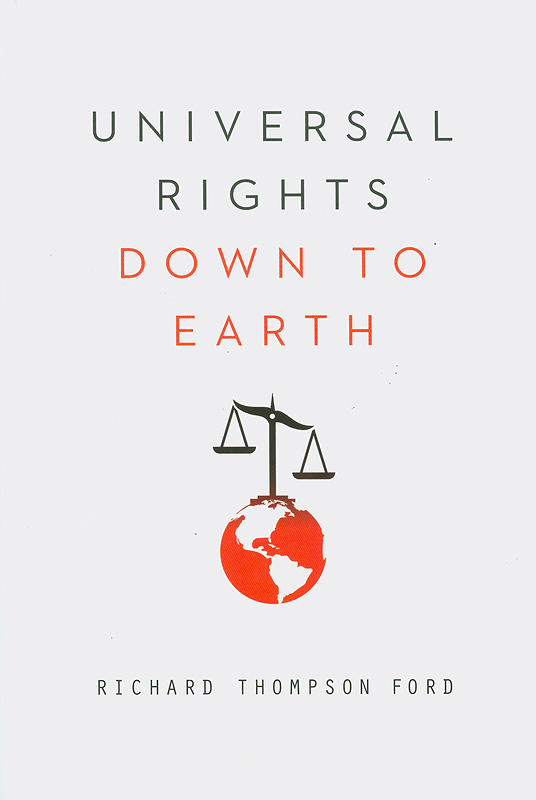
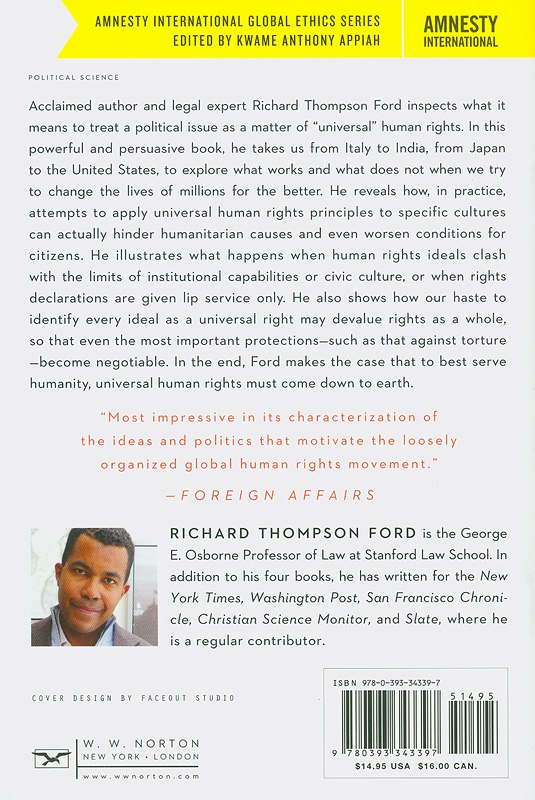
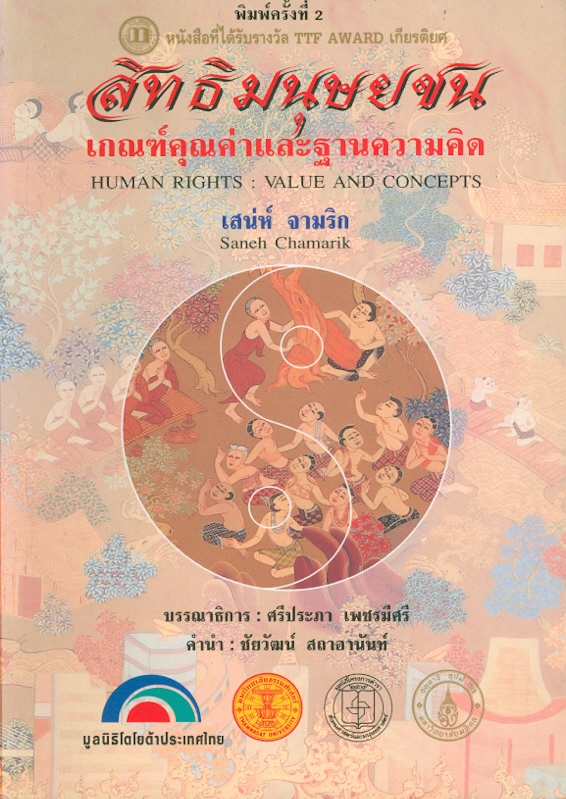
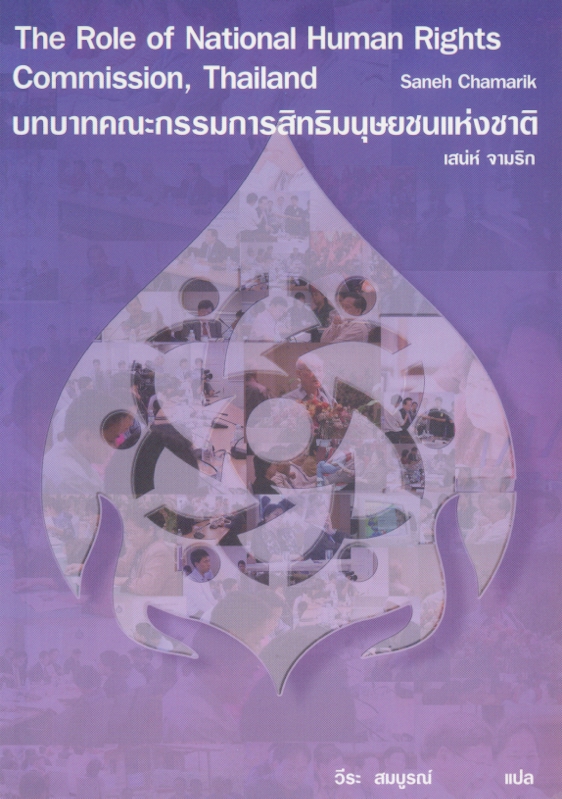
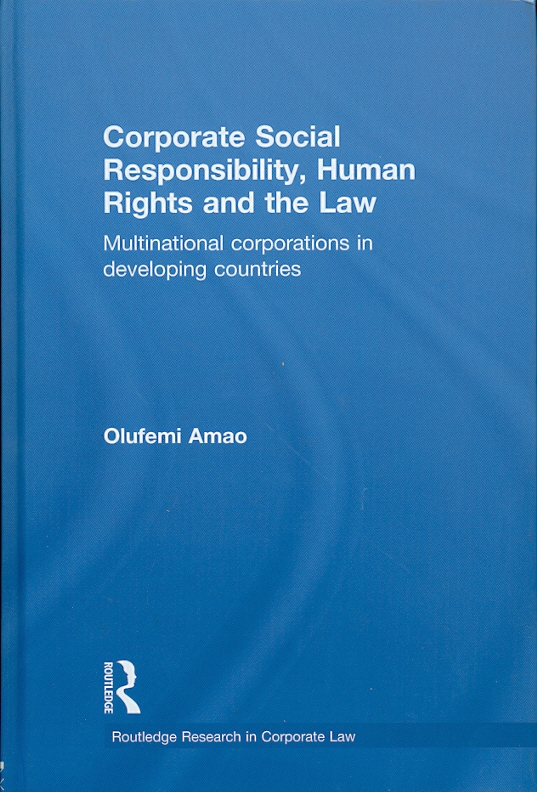
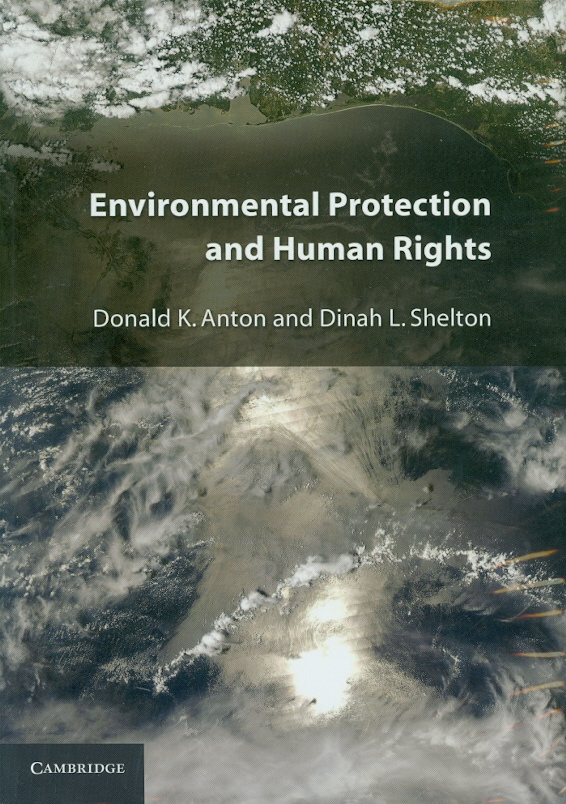
before adding tags or comments.